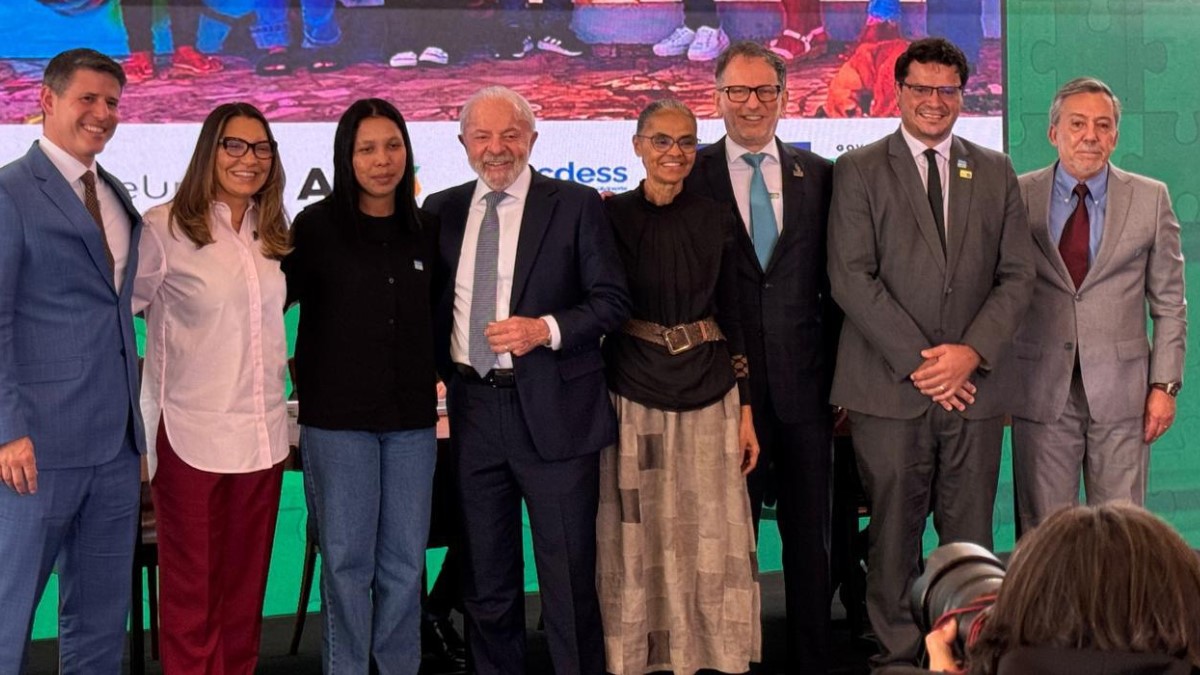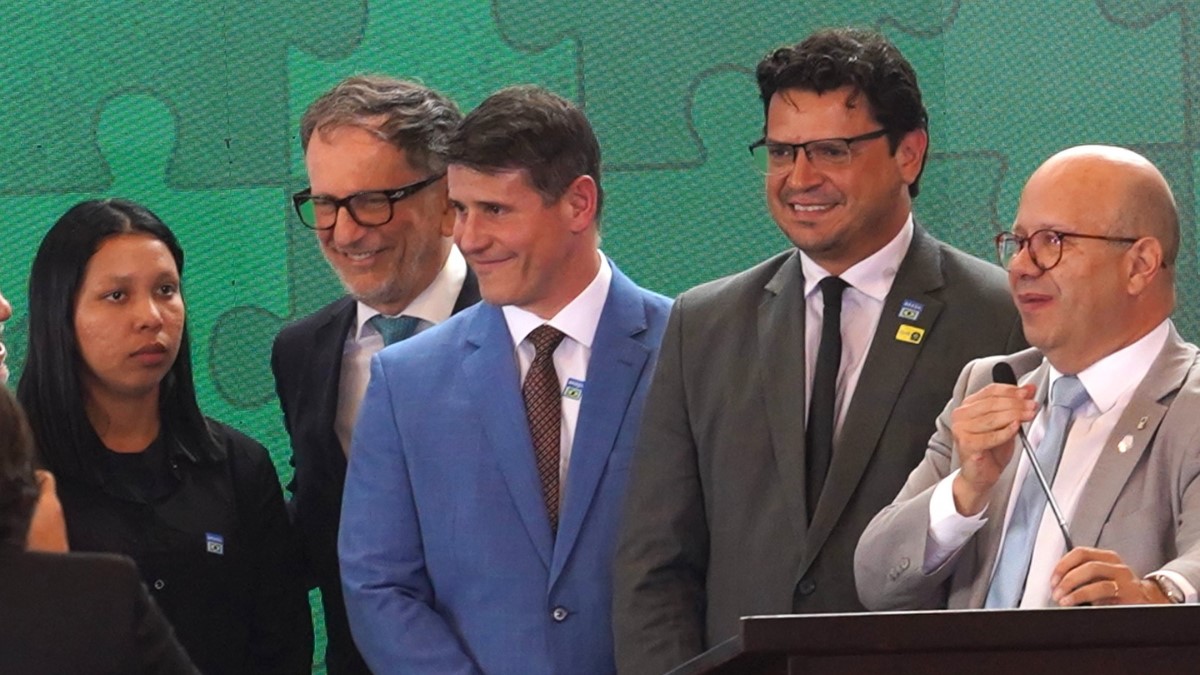Partnership between MMA, ABES and ReUrbi will promote digital literacy, income generation and environmental preservation through the reuse of IT equipment
 Mobilization “Amazon More Digital and Less Unequal”
Mobilization “Amazon More Digital and Less Unequal”
During the plenary meeting of the Council for Sustainable Social Economic Development (CDESS), which was attended by the President of the Republic, State Ministers and Councilors, the mobilization was officially launched “Amazon More Digital and Less Unequal”— an initiative coordinated by the Ministry of the Environment and Climate Change (MMA), ABES (Brazilian Association of Software Companies), and ReUrbi Socioambiental, with institutional support from CDESS. The initiative is based on digital literacy, professional qualifications, and sustainability, through the donation of refurbished information technology (IT) equipment. The initiatives will be implemented through the RHTECH digital learning platform (created and maintained by ABES) and through support for local NGOs working in education and technological training.
The initiative is led by Rodolfo Fücher, ABES advisor and CDESS member, and Ronaldo Stabile, founder and CEO of ReUrbi, and aims to transform digital inclusion into a tool for sustainable development, income generation, and environmental preservation in the Legal Amazon, especially in light of the social and structural challenges that still mark the region.
"We believe that a standing forest depends on standing people, with dignity, access to information, and real opportunities. This mobilization integrates technology, education, and sustainability to ensure a more just and connected future for the Amazon region," emphasized Rodolfo Fücher. "We have a unique opportunity to show Brazil and the world, in the context of COP30, that digital inclusion is key to environmental preservation. By reusing electronic equipment, we bring knowledge and reduce the environmental impacts of improper disposal. It's a concrete, scalable, and transformative action," added Ronaldo Stabile.
The “More Digital and Less Unequal Amazon” mobilization follows the model of Mobilization for the Reduction of Inequality", carried out with the same partners, and in which ABES ensures, free of charge, simply, and easily, that companies of any size can adhere to best socio-environmental governance practices, aligned with the UN Global Compact. ReUrbi, in turn, guarantees companies that dispose of their IT and telecom equipment a reverse logistics process in compliance with environmental legislation and the proper disposal of disused products, avoiding environmental impact and generating resources for social and socio-digital qualification projects.
The National Secretary of Urban Environment and Environmental Quality of the Ministry of Environment and Climate Change, Adalberto Felicio Maluf Filho, also participated in the launch and reinforced the importance of the mobilization as an example of an initiative that unites environmental responsibility, social development and coordination between government, the private sector and civil society.

"We believe that technology and sustainability must go hand in hand. This mobilization will contribute to the social and economic development of the Amazon region, while also helping to reduce the improper disposal of electronic waste. Brazil can only benefit from this idea," says Andriei Gutierrez, president of ABES.
Social and environmental impacts
ReUrbi will collect and recondition the equipment, which will also provide socio-environmental impact reports to donor companies. The project aligns with eight of the 17 UN Sustainable Development Goals (SDGs), such as quality education, decent work, reduced inequalities, and climate action.
"It's estimated that 30% of the 23 million kilograms of IT equipment discarded by Brazilian companies annually could be refurbished and transformed into tools for social transformation. And each ton of IT treated prevents the emission of 1.9 tons of greenhouse gases and the release of 12 kg of toxic metals. In other words, in addition to bringing digital inclusion to the Amazon, we'll be directly contributing to the preservation of the Amazon rainforest," adds Gutierrez.
Since its launch in 2021, the Mobilization for Reducing Inequality has prevented the impact of 608 tons of greenhouse gases and 3,788 kg of toxic metals on the environment through the proper recycling of more than 320 tons of obsolete ICT equipment. The funds raised from this recycling have supported 29 social projects—seven of which are in the Amazon region—impacting more than 51,000 people. "Promoting digital inclusion in vulnerable communities in the Legal Amazon will further enhance the positive impact we seek to promote in society," says Fücher.
Companies interested in donating IT equipment – such as notebooks, desktops, monitors, servers, printers and peripherals – can register via official landing pageNonprofit organizations in the Legal Amazon that work with digital inclusion and qualification can also register to receive the equipment.
Young woman benefiting from the project shares her experience
Rosemar da Silva, a representative of the riverside community of São Francisco do Bujarú, in Iranduba, attended the ceremony and shared how access to technology can transform the reality of previously invisible communities. At 21, she carries in her eyes the strength of someone who dreams big. Born in Manacapuru, Amazonas, she now lives in the community, and in the middle of the forest, where internet signal was once as rare as asphalt, Rosemar is now studying higher education remotely, something that once seemed impossible.
This change began with the arrival of a small computer lab, which brought not only computers but also a connection to the world. "With fast internet and a shared study space, I can now attend classes, complete assignments, and conduct research with the same ease as students in big cities," he says.
More than a personal achievement, Rosemar sees technology as a bridge to transform the future of her community. "For me, studying isn't just a path to achieving my dreams, but a way to help other young people believe they can achieve them too."
About ABES
ABES (Brazilian Association of Software Companies) aims to contribute to the construction of a more digital and less unequal Brazil, in which information technology plays a fundamental role in the democratization of knowledge and the creation of new opportunities for all. In this sense, it aims to ensure a business environment conducive to innovation, ethical, dynamic, sustainable and globally competitive, always in line with its mission of connecting, guiding, protecting and developing the Brazilian information technology market.
Currently, ABES represents around 2,000 companies, which total approximately 80% of the software and services sector's revenue in Brazil, distributed across 24 states and the Federal District, responsible for the generation of more than 260 thousand direct jobs and an annual revenue of around R$103 billion in 2024. Access the ABES Portal or call +55 (11) 5094-3100.













